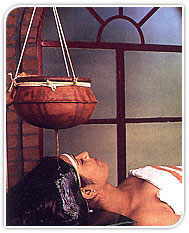Ayurveda: The Science of Life
 Ayurveda,
with its tridosa or three humors system, is able to provide a complete
understanding of the cause of health in terms of a metabolic balance.
Disease is simply understood as an imbalance between the nerve energy
(vata), catabolic fire energy (pitta) and anabolic energy (kapha). All
foods and experiences have an effect on the overall balance of these
perspective humours. Imbalance of the tridoshas leads not only to impaired
health, but also to an impaired mental condition, because the mind's
health is dependent on the body's health.
Ayurveda,
with its tridosa or three humors system, is able to provide a complete
understanding of the cause of health in terms of a metabolic balance.
Disease is simply understood as an imbalance between the nerve energy
(vata), catabolic fire energy (pitta) and anabolic energy (kapha). All
foods and experiences have an effect on the overall balance of these
perspective humours. Imbalance of the tridoshas leads not only to impaired
health, but also to an impaired mental condition, because the mind's
health is dependent on the body's health.
Ayurveda, therefore,
aims to keep the three humours in equilibrium for only then can perfect
health be attained and maintained. As each individual has his own
particular balance or blend of these three forces, Ayurvedic treatment are
person specific rather than disorder specific. The physician emphasizes a
regimen of diet with the use of appropriate drugs. The age of the patient,
the climate in which he lives, his cultural and social surroundings, and
his bodily construction, needs to be taken into account before offering a
prognosis. Touch, inspection, and interrogation are the main tools of
diagnosis.
In Ayurveda, the diagnosis is more comprehensive of
the examination offsets any deficiencies because of the subjectivity of
the diagnosis. Ayurvedic treatment is carried out through the internal and
external use herbal medicine in a coordinated or integrated manner, as
well as through surgery. Herbs are used to eliminate excesses and
strengthen deficiencies. While they may possess a power- full nutritive
impact on a weakened body, their primary action is to stimulate particular
organic functions. Thus through adjustment of diet only, Ayurveda aims to
solve many health problems. Such an approach has proven effective over the
centuries and as a result many of Ayurveda's healing regimens have been
adopted and refined by people all over the world.
 Ayurveda,
with its tridosa or three humors system, is able to provide a complete
understanding of the cause of health in terms of a metabolic balance.
Disease is simply understood as an imbalance between the nerve energy
(vata), catabolic fire energy (pitta) and anabolic energy (kapha). All
foods and experiences have an effect on the overall balance of these
perspective humours. Imbalance of the tridoshas leads not only to impaired
health, but also to an impaired mental condition, because the mind's
health is dependent on the body's health.
Ayurveda,
with its tridosa or three humors system, is able to provide a complete
understanding of the cause of health in terms of a metabolic balance.
Disease is simply understood as an imbalance between the nerve energy
(vata), catabolic fire energy (pitta) and anabolic energy (kapha). All
foods and experiences have an effect on the overall balance of these
perspective humours. Imbalance of the tridoshas leads not only to impaired
health, but also to an impaired mental condition, because the mind's
health is dependent on the body's health.